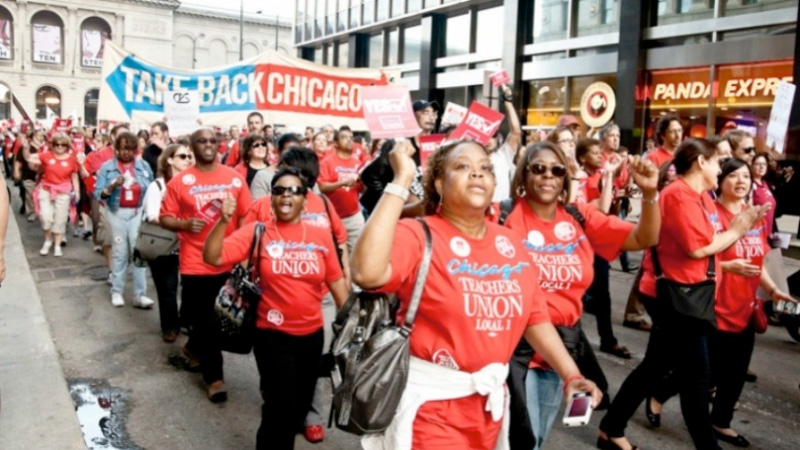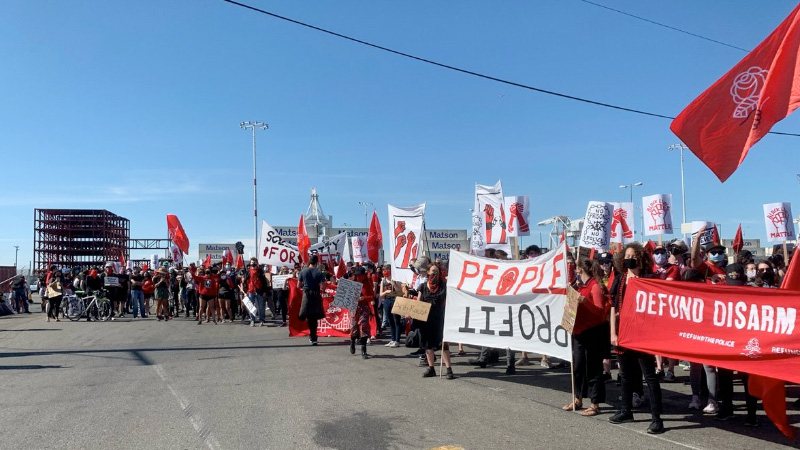Framing the 2020 election

We organized the meeting today to have a discussion about what we think the Left should be doing, what we should be collectively discussing during this election, and what role we see for Tempest. There is an incredible depth of political experience among the participants here. So, I am not going to give you my specific predictions, or my latest assessment of the FiveThirtyEight polls, or the most recent articles about the horse race in Politico or the New York Times. Rather, I want to lay out some of the framework that we in the Tempest Collective share in approaching the elections (and much else).
Starting from the big picture, we understand the political dynamic of this moment to be wholly conditioned by a set of international crises: of neoliberalism, as the model of capitalist accumulation that has defined the last forty-plus years; a concomitant crisis of political representation of the ruling class and their parties, undermining the stability of national political systems internationally; political polarization and a generational process of radicalization on both the Left and the Right. On top of all this, is the environmental crisis, which is an acute and existential manifestation of the choice of barbarism which Rosa Luxemburg warned about. Again, this dynamic and these crises are not at all unique to the U.S., but are an international phenomena.
This international framework is important in many ways. One is that it frames an understanding of the specific U.S. experience. Rather than seeing Bernie Sanders as the contingent factor that caused a broad radicalization starting in 2016, we understand Sanders as a specific—and important—manifestation in the U.S. of political dynamics unleashed by these crises. However Sanders amplified and cohered a national discussion about socialism, we do not credit his campaign strategy as the key to ensuring that this process of radicalization leads to qualitative advances for working class people. Most important to the socialist project among these advances would be the creation of lasting organizations of struggle and resistance; strong, independent political organizations for the working class. This was a test that was failed by the last generational radicalization in the 1960s and 1970s.
In regards to the election itself, while Tempest Collective members have some differences of emphasis on what is distinctive about the 2020 election cycle, we share a number of things in common.
First, we retain a broad agreement of opposition to lesser-evil politics.1 These are arguments that the Left has been having to engage every four years since the 1930s (at least). We would have opposed the Left voting for Hindenburg in Germany in 1932, or Adalai Stephenson in the U.S. in 1952, or Hubert Humphrey in 1968, or “Reporting for Duty” John Kerry in 2004. And we oppose rallying the Left’s votes for the lesser-sexual assaulter, Joe Biden, today.
Second, at the same time, we recognize what is qualitatively distinct about 2020 and most importantly the very serious threat represented by the Right, and the far right in particular. We understand that the Trump administration is not in the present moment a fascist regime. Given the actual balance of class forces and the weakened, but continuing constitutional order and state of democratic rights, calling Trump a fascist is not a scientific assessment, whatever its moral force. Nonetheless, Trump is opening the path, and creating a trajectory for that possibility, inevitably with U.S. characteristics. So how do we balance these two understandings, the argument against lesser-evilism and the specific and unique threats represented by Trump?
Our starting point is not that of the individual voter in a bourgeois republic. Rather, it is to ask how a small and developing Left can become better able to combat Trump and Trumpism; better able to overcome obstacles to organizing our forces, whatever the outcome of the election.
We reject claims that the Left is responsible for Trump or that a few Green Party votes explain what allowed him to win in 2016, and win over the Republican Party—including its working class supporters.
We are not concerned to police the individual conscience in the ballot box, and we are not advocates of exhorting people in the streets that they must not support Biden. Rather, we are profoundly concerned about those sections of the Left that are operating as though their primary role is whipping votes for Biden. Unfortunately, while the base within the Left that rejects lesser-evil voting is stronger after the experiences of Obama and Clinton, the power of lesser-evilism is intensified today because of the unique danger that Trump represents.
Those sections of the Left who are spending their political energies urging a vote for Biden risk doing active harm to our movement. This is a danger because it reinforces for the very young and newly emergent socialist left that electoral contests are the key political front. It also—despite whatever intentions of Biden vote whippers—reinforces, because of the context, illusions that the Democratic Party, Biden, and the U.S. state will protect us against the threat represented by Trump and his movement.
There are those in our movement who have argued either that fascism is here now or that fascism will be enacted with a Trump victory on November 4. Some of them have been exactly those who were most resistant to supporting anti-fascist action over the last four years, downplaying the physical threat to the Left and social movements by privileging electoral organizing.
These are often the same forces that were slow, or resisted, transforming the 70,000-person Democratic Socialists of America (DSA) into a vehicle of support for the most important, largest social rebellion in a generation. If we are going to defeat an emergent fascism or far right, it is the Black liberation movement together with the emerging vanguard of the labor movement that will matter most to our side. This does not mean that it doesn’t matter who is in the White House, but it does mean interrogating our perspectives and strategic priorities and deciding what we are doing with our still small forces. Those on the socialist Left who are whipping votes for Biden need to be subject to precisely this interrogation.

Despite hand-wringing about stolen elections or undemocratic maneuvering by Republicans to fill Bader-Ginsburg’s Supreme Court seat, it is notable that we have not seen generalized calls for mobilization and organizing in defense of democratic rights. If the threat is as severe as we might expect, why are there not yet calls for such efforts? Rather, we have seen increased messaging about the importance of voting—voting in an increasingly undermined, and unreliable context. The revolutionary Left has sometimes been reticent to come to the defense, and lead activism in the defense of, democratic rights. There are a number of reasons for this. Regardless, while we question what those on the Left who have been focused on Biden advocacy are doing in this regard, we should be willing and able to contribute, within the bounds of our capacities.
There is a critical importance of having a political pole on the Left that retains the perspective outlined above. It is equally important that such a pole is embedded in social movements and the emerging Left, including the ongoing rebellions, including in the emergent workers movement within and outside the unions, and within DSA.
Tempest is not interested in walling ourselves off from the messy and politically raw and heterogenous, new radicalization. We believe in the absolute principle of the necessity of political independence for the organizations of the working class and oppressed people. The strategies for how we achieve that have to be debated—urgently and openly. The discussions about how we position ourselves during this election do not exist in a vacuum, they are inevitably a proxy for those deeper strategic debates. We have seen that the Biden vote whippers are motivated by a notion that struggle in the electoral arena is primary, that winning elections is how you “build power”. Tempest rejects this framework. Again, we are not abstentionist on elections or indifferent about who sits in the White House, but our immediate tasks are not there.

I am going to express my personal opinion as I am not sure everyone in the Tempest Collective would put this as baldly. What we are witnessing is those forces within DSA, which placed all of their eggs in the basket of the Sanders campaign, being left without any strategic clarity. The call for “dirty break” has given way to arguments for “deepening contradictions”, exhortations to vote Biden, and promises of a possible break from the Democratic Party 10 or 15 (or more) years from now. Even one of the most prominent proponents admits that in the short term “dirty break” looks little different than the historic Harringtonite realignment strategy. It looks little different because it is little different. What this has meant within DSA is that largest section of the organizational leadership has an explicit realignment wing to the right, and a once “dirty break”, now de facto realignment wing to the left. This is the context of the current debates about the elections within the DSA milieu.
In the context of these international crises, the radicalization and polarization of Left and Right, the socialist Left is both numerically stronger and politically weaker than what we might have hoped. This dynamic may have been inevitable given the state of working class struggle, organization, and consciousness after forty years of one-sided class war and neoliberal onslaught and disorganization. In this context, it is incredibly important that we do not concede to the political shift to the right within sections of the leadership of the burgeoning movement. This is not a moral imperative—we are not interested in heresy hunting on the Left—this is about the need for a clear perspective and strategic clarity. In this the revolutionary Left—including but not limited toTempest—has much to offer. We can only do so if we retain modesty about our forces, and a recognition that the model which served us for forty years had in-built contradictions that themselves must be interrogated and left behind.
As Tempest we want to be both one of the organizing forces for the political current that broadly shares the framework outlined above and a space for open and comradely debates on perspective and strategy. While we share a set of politics and a perspective, we are not a line publication, nor a proto-party. So even if you don’t agree with everything I outlined above—and I’d be surprised if most did agree with everything—we invite you to, at a minimum, participate in the debates. And if you agree about the urgency both for rebuilding the current of revolutionary socialism and in the related good faith effort to build and support the once-in-a-generation emergent Left, please think about joining us.
Featured image credit: Gage Skidmore via Wikimedia Commons.
- For an excellent general discussion of the problem of lesser evilism in the 2020 U.S. election, see the interview of Tempest Collective member Ashley Smith on the International Socialist League’s International Panoroma.↩
Categories
We want to hear what you think. Contact us at editors@tempestmag.org. And if you've enjoyed what you've read, please consider donating to support our work:
DonateAaron Amaral View All
Aaron Amaral is a member of the Tempest Collective and serves on the editorial board of New Politics.
